 Petzlover
Petzlover Pantherette is originated from United States but Russian Blue is originated from Russia. Both Pantherette and Russian Blue are having almost same weight. Pantherette may live 5 years less than Russian Blue. Both Pantherette and Russian Blue has same litter size. Both Pantherette and Russian Blue requires Low Maintenance.
Pantherette is originated from United States but Russian Blue is originated from Russia. Both Pantherette and Russian Blue are having almost same weight. Pantherette may live 5 years less than Russian Blue. Both Pantherette and Russian Blue has same litter size. Both Pantherette and Russian Blue requires Low Maintenance.
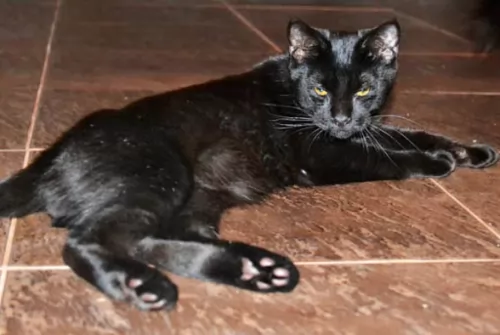 There isn’t too much history to the beautiful black Panetherette cat as it is still in development. It is in other words a hybrid cat and the name ‘Pantherette’ was give to the cat to describe its magnificent looks.
There isn’t too much history to the beautiful black Panetherette cat as it is still in development. It is in other words a hybrid cat and the name ‘Pantherette’ was give to the cat to describe its magnificent looks.
It looks just like the wild Black Panther or Black Leopard. There is, however, certainly no wild black panther or leopard that has been used
The Pantherette is a hybrid breed of cat that is still under development. It is intended to look similar to a Black Panther. It is a new breed based on a Melanistic (Black) Bengals as one of the foundation breeds.
The Pantherette is registered with the International Progressive Cat Breeders Alliance (IPCBA).
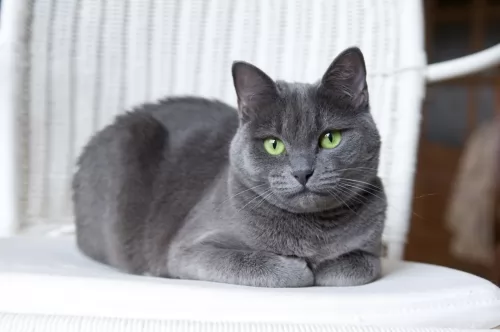 It is believed that this beautiful cat originates from Russia, and more specifically the Archangel Isles.
It is believed that this beautiful cat originates from Russia, and more specifically the Archangel Isles.
It is also thought that these cats descended from cats that were kept by the Russian Czars and that they arrived in England and Northern Europe during the 1860s. It appeared in cat shows and by 1912 it was given its own classification.
The cat was also introduced to the United States in the early 1900s and today it is a popular domesticated pet.
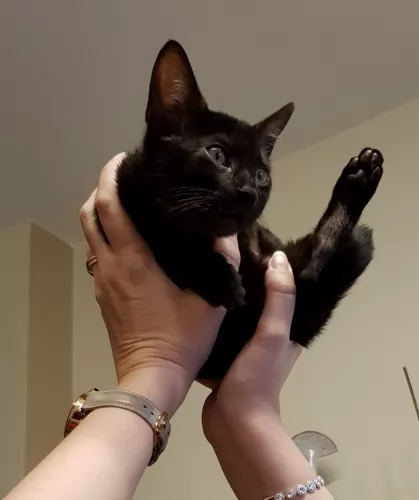 The Panehterette is a medium to large black cat still being developed, It weights in the area of 4 – 9kg. It is muscular and strong with a long body and a broadish head.
The Panehterette is a medium to large black cat still being developed, It weights in the area of 4 – 9kg. It is muscular and strong with a long body and a broadish head.
The legs at the back are slightly longer than the front. The legs are strong and muscular and medium in length with large, round paws. The tail of the Panethereet is medium to long in length, thick and slightly tapered.
The beautiful coat is short to medium in length and luxurious and silky. The ears are small to medium with rounded tips. The eyes are oval and set wide apart. They can be gold-colored or green.
The Pantherette breed is still in the beginning stages of its development, so there isn’t too much information on its temperament. Those who work with these cats say that they have the typical temperament of a domesticated cat and that they are alert, friendly, curious and that they enjoy being in the company of their human companions.
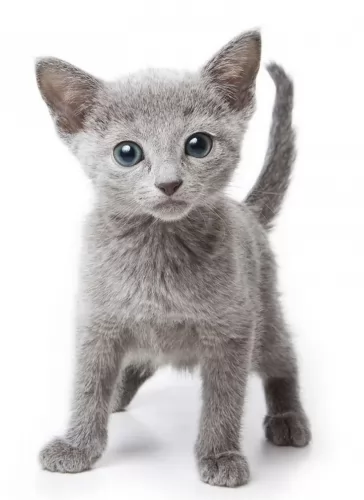 The medium-sized Russian blue cat is slender, strong, and muscular with long legs. He can weigh between 3 and 6kg.
The medium-sized Russian blue cat is slender, strong, and muscular with long legs. He can weigh between 3 and 6kg.
He has a beautiful blue, soft double coat that is short and thick. The coat is an even color with silver tips. What is an attractive feature of this cat too is that his double coat doesn’t shed much. The cat has a triangular-shaped head with yellow to green eyes.
The Russian Blue is such an amicable, sweet-tempered cat that likes nothing more than to be in the company of his human owners, He is calm and independent. They do well living with their human families but they do tend to form a deep bond with that one special person.
He will even follow his owner everywhere and is a loving, loyal companion. The Russian Blue is a social cat but also enjoys some quiet time out just to chill. He also isn’t too fond of visitors and may run away and hide if the occasion becomes too large and noisy.
This is a cat that will miss you when you’re at work all day but he is able to quietly wait for your arrival back home. Then he will appreciate some playtime.
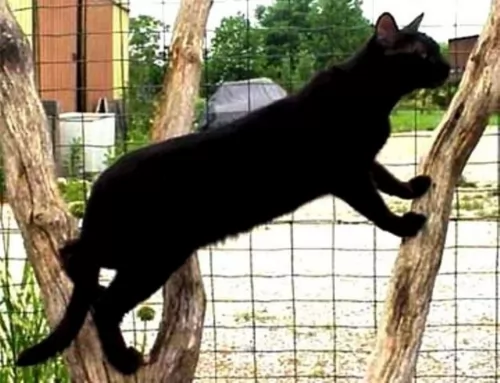 Domestic hybrid cats such as the Pantherette make great pets. However, you need to bear in mind that these cats have that wild side to them and they often try to escape.
Domestic hybrid cats such as the Pantherette make great pets. However, you need to bear in mind that these cats have that wild side to them and they often try to escape.
They are larger than the regular cat and its always advisable to have an outdoor shelter for them as well. The Pantherette is a truly beautiful cat but read up all you can on hybrid cats before you bring one into your home.
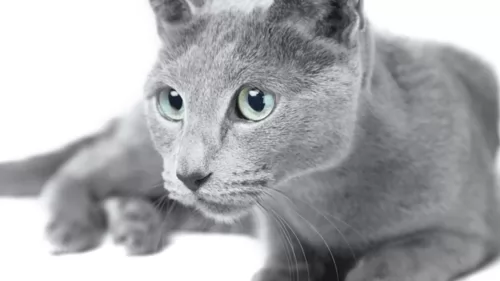 Your Russian Blue is such an intelligent cat and for this reason, when you bring one into your home, you’ll need to provide him with lots of stimulating toys and fun play times.
Your Russian Blue is such an intelligent cat and for this reason, when you bring one into your home, you’ll need to provide him with lots of stimulating toys and fun play times.
This is also a low maintenance cat and a brush once a week will be all that is required.
These are cats that love their mealtimes and you’ll want to work out a special eating program to ensure he gets all the nutrition he needs without over-eating.
Respond with lots of love and attention to your vocal Russian Blue, and you’ll soon see what a precious jewel this cat is as a companion and friend.
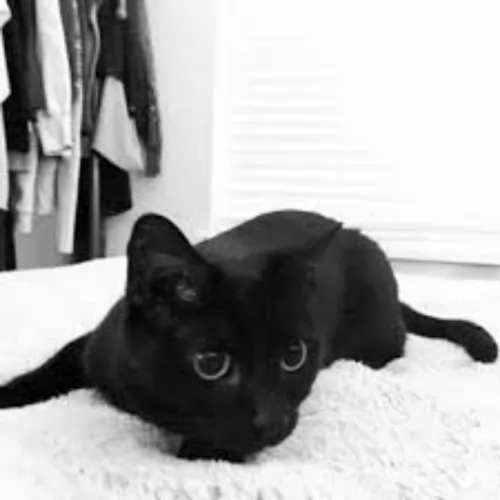 Hybrids suffer from genetic defects. These defects can often require surgery. A cat such as the Pantherette also requires a top-notch diet. You may even have to speak to your vet because these cats often battle to digest their food.
Hybrids suffer from genetic defects. These defects can often require surgery. A cat such as the Pantherette also requires a top-notch diet. You may even have to speak to your vet because these cats often battle to digest their food.
People who work with these hybrid cats say that a problem they often see is inflammatory bowel disease and diarrhea. Remember that cats like these are carnivores and their diets have to be made up essentially of meat if they are to remain healthy.
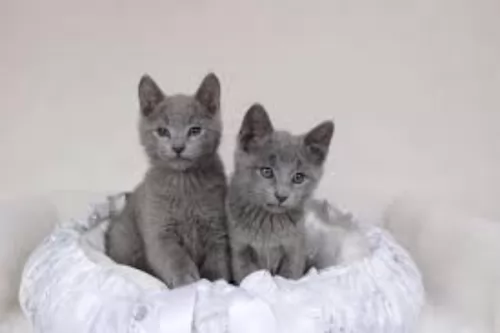 Because the Russian Blue is a naturally occurring breed, they are fairly healthy cats. Watch out for obesity and urinary tract infections with your cat.
Because the Russian Blue is a naturally occurring breed, they are fairly healthy cats. Watch out for obesity and urinary tract infections with your cat.
Obesity shortens a cat’s life. It puts extra pressure on the cat’s joints and it makes them more likely to develop disease. Then again, it is dangerous to suddenly put your obese cat on a strict diet so that he loses weight too quickly.
Your cat requires a gradual decrease in body weight. If you’re worried about your cat’s weight, rather speak to a veterinary surgeon who can explain to you and also draw up a weight loss program for your cat.
Remember too, that cats are carnivores and they simply have to have meat in their diet. Commercially manufactured cat foods of the highest quality are high in protein and low in carbohydrates.
Feline lower urinary tract disease is no joke for a cat. This disease affects your pet’s lower urinary tract – the bladder. Causes include bladder stones or bladder infections and inflammation in the urinary bladder.
You may notice your cat battling to urinate. Your cat will also no doubt cry out while trying to urinate and this is because the process is so painful. There may also be blood in the urine.
You may notice that your cat isn’t using his litter box but urinating elsewhere. Your cat will need to get to the vet as soon as possible. It may not be a life-threatening disease but it can be highly uncomfortable for your cat.
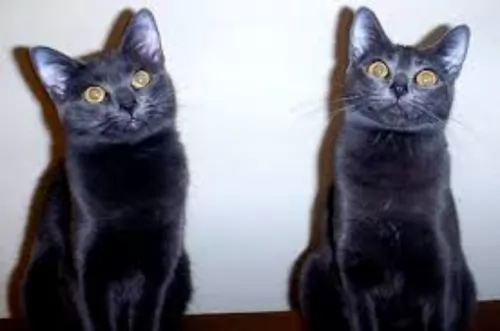 To ensure a quality lifestyle for your Panetherett, you want to care for him properly. A well cared for cat is one that becomes the best pet.
To ensure a quality lifestyle for your Panetherett, you want to care for him properly. A well cared for cat is one that becomes the best pet.
He will have to go to the vet at some stage for sickness and for his vaccines.
Make sure you invest in a cat carrier or sturdy leash as your cat won’t like going to the vet. These cats can struggle, wriggle and writhe and he will make every effort to get away.
Speak to your vet about ticks, fleas, and worms in your pet as these parasites can cause havoc with your cat’s health.
Domestic hybrids such as the Pantherette will need to have a litter box that is cleaned every day. These cats like a clean litter box. Make sure that you scoop the litter box at least one time each day. If you don't clean his litter box regularly, you’ll find that he tends to use other areas of your home as a toilet. Being a hybrid, it is quite likely that he will in any case as these cat's wild side see to this.
Ensure he gets the best cat food there is. A cat is a carnivore which means he is a meat eater. If you buy commercially manufactured pet food, make sure that the top ingredients on the label have meat and protein listed at the top.
Speak to your vet about the absolute importance of quality cat food for your feline pet, as poor quality food can make your cat sick and you’ll be spending more time at the vet.
Cats can easily become dehydrated, so ensure that he has a bowl of fresh, cool water available to him around the clock. You can have one or two water bowls available to him and the water bowls must be cleaned regularly.
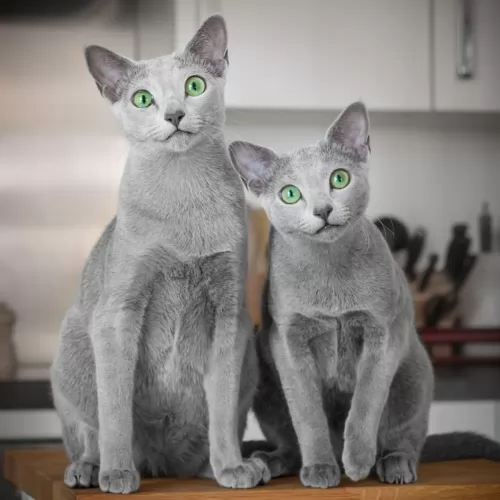 The Russian Blue’s beautiful blue coat is short and thick and will do well with a brush once a week. The cat just thrives on the attention during brush time too.
The Russian Blue’s beautiful blue coat is short and thick and will do well with a brush once a week. The cat just thrives on the attention during brush time too.
Trim your Russian blue’s nails regularly.
Provide your cat with everything he needs to make his life pleasant. Food and water bowls, a litter box, a collar and tag, a nice soft bed, grooming accessories, climbing tree, and a scratching post.
Make sure he has his cat vaccines and is treated for parasites.